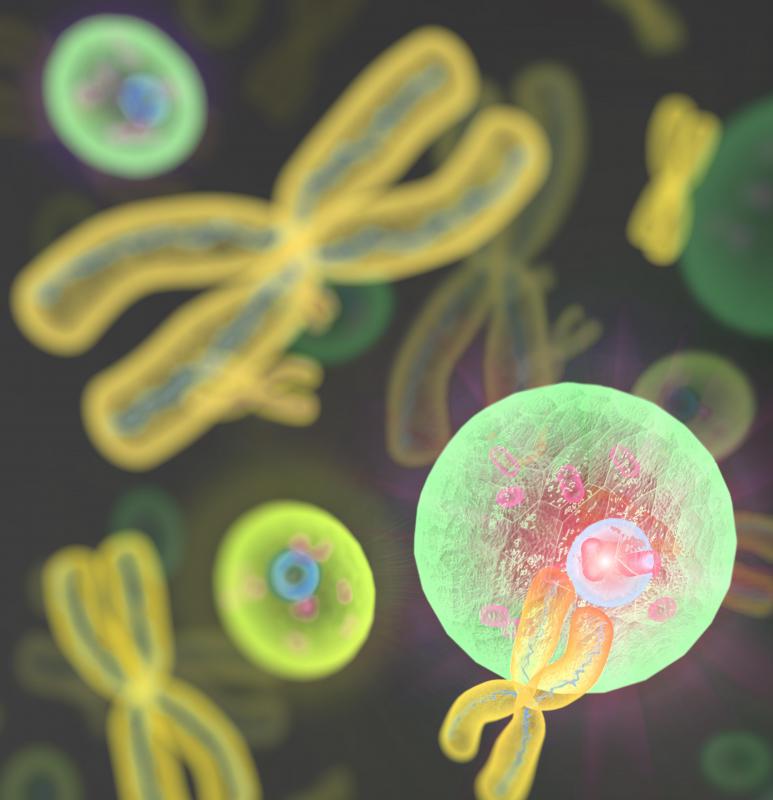At WiseGEEK, we're committed to delivering accurate, trustworthy information. Our expert-authored content is rigorously fact-checked and sourced from credible authorities. Discover how we uphold the highest standards in providing you with reliable knowledge.
What is DiGeorge Syndrome?
DiGeorge syndrome is a genetic disorder that can cause a number of different symptoms. The condition results from a deletion or abnormality of chromosome 22 during the earliest stages of development. Depending on the size of the deletion and which genes are compromised, patients with DiGeorge syndrome can have vastly different symptoms. Most cases, however, involve some degree of immune system suppression, heart defects, and physical abnormalities such as cleft lips. Treatment may involve surgery to correct defects and lifelong medical management of immune system problems.
Most cases of DiGeorge syndrome arise spontaneously due to a random genetic defect. It is possible, however, for a carrier of a malformed chromosome 22 to pass the condition down to offspring. Chromosome 22 contains the genes that, among other functions, promote the development of the thyroid and parathyroid glands. DiGeorge syndrome can result in absent or defective glands that are unable to produce T-cells, which are essential for immune system functioning.

In addition to weakening the immune system, severe varieties of DiGeorge syndrome can result in defects of the heart muscle, kidneys, and face. Many infants have small heads, square ears, and cleft lips and palates. A baby may have difficulty feeding, hearing, and seeing due to facial defects, and a number of affected infants suffer from mental retardation. Physical and mental development are usually delayed, and children are usually much smaller and weaker than their peers.

A doctor who suspects DiGeorge syndrome typically consults with a team specialists to confirm the diagnosis. Genetic tests and blood screenings are used to look for a chromosome 22 deletion and abnormally low levels of white blood cells. X-rays, computerized tomography scans, and other imaging tests are conducted to gauge the severity of heart defects. Since the condition can be inherited, parents are usually asked to undergo diagnostic tests as well to check for chromosome 22 defects.

Treatment for DiGeorge syndrome depends on the symptoms present. Emergency surgery is needed if heart defects are serious enough to induce cardiac arrest. Additional surgeries throughout early childhood can be performed to correct facial deformities, and hormonal supplements may be prescribed to compensate for poor thyroid functioning. Hearing aids, speech therapy, and special education programs are important for many children to achieve their fullest potential in school. With ongoing medical care and mental health services, most patients are able to reach normal life expectancies and maintain some degree of independence.
AS FEATURED ON:
AS FEATURED ON:
















Discussion Comments
@letshearit - I don't think genetic screening is the answer for things like DiGeorge syndrome. I really believe that it shouldn't be up to a third party whether an embryo goes to full-term or not. I think nature chooses which babies make it and which don't.
While it may seem cruel to let a baby live that has numerous health issues, modern science has improved a lot and there really is a lot of hope, even for those with heart defects.
My cousin has a heart defect and surgery has done wonders for his quality of life. Was the process easy? Of course not, but he's happy to be alive.
Do you think that genetic screening is the answer for preventing things like DiGeorge syndrome? Would you rather terminate an embryo that was guaranteed to have severe issues, such as deformities or poor health, or just let it develop and hope for the best?
I am honestly for genetic screening if the embryo will suffer as it grows older. It seems cruel to me to let a child be born that will be riddled with health problems and face numerous surgeries.
Sometimes I wonder if people are selfish to want to keep a child alive even though they are suffering and have severe retardation combined with things like numerous heart defects.
It really saddens me when I hear about a child born with a genetic disease, such as DiGeorge syndrome. It is difficult for the infant, and very hard for parents and other family to cope with. There are lots of questions to be answered and decisions to be made. Extra time and energy are needed to care for the new child.
I believe that there are some Digeorge Syndrome support groups around the country. If I were in this situation, I would join a group to get much needed support and an opportunity to help others.
I can't even imagine what it must be like to have a child like this -- I know it must be so hard to deal with the effects of the symptoms of DiGeorge syndrome on a daily basis. Are there support systems in place for these parents?
There was a boy in my class while growing up who was born with a cleft lip. I don't know if this was caused by DiGeorge syndrome or not, but know that he had to go through several surgeries to correct this problem.
We lived in a small town where everyone knew each other. I am sure this was not easy for this boy, but I don't remember kids that knew him teasing him. He probably got quite a few stares when he went places where people didn't know him though.
He had to wait several months between each surgery, and has some scarring on his upper lip, but now you would never know unless you were looking for it. It is amazing what they can correct with the right doctors and surgery.
I am sure there are kids in other countries who are born with something like this and don't have the opportunity to have it corrected.
Digeorge syndrom can also affect the brain and therefore the patient might have mental and behavioral problems.
Post your comments